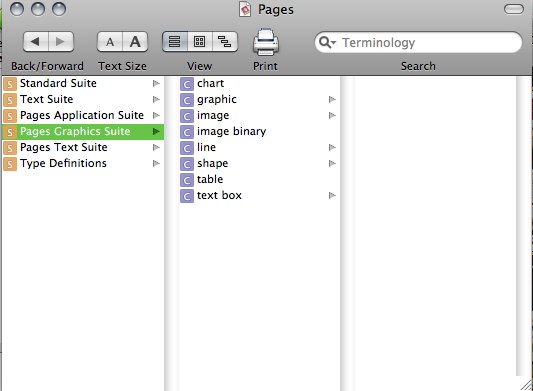

If you compile your script as an application then 'name of me' will work. However applescripts are run by applescript runner so when you use that on a script you get 'Applescript Runner' as the name. O’Reilly members experience books, live events, courses curated by job role, and more from O’Reilly and nearly 200 top publishers. The normal way to get the name is by using 'name of me'. Get AppleScript: The Definitive Guide, 2nd Edition now with the O’Reilly learning platform.
#Applescript get plain text of compiled scpt file code
You cannot save as a compiled script file code that, for whatever reason, will not. I'll discuss these further contents of a compiled script file in " Persistence of Top-Level Entities" in Chapter 8 and " Closures and Stored Script Objects" in Chapter 10.) (There is actually more to a script, and therefore there can be more to a compiled script file, than the compiled bytecode. When an application has asked the AppleScript scripting component to compile some text, a compiled script file is the only way for the compiled script to outlive that instance of the AppleScript scripting component, which will go out of existence when the host application quits. Script Editor does this for me automatically if I copy the code (as text) into a blank script and and compile it with Capture One 12 running. Script editor applications save a script as a compiled script file by default. Applications that act as script runners typically operate on compiled script files (see " Script Runner" in Chapter 2). Takes a selection of compiled AppleScript (.scpt) files, and converts them to plain-text applescript files. Obviously this architecture is advantageous when the script is not going to change and therefore will not need compiling ever again-when you distribute the script to others, for example. Intended for use in an Automator service. A lengthy script can take several seconds to compile, so a compiled script file clearly saves some time and overhead when the script is executed. Unlike text, a compiled script file can be executed without being compiled (because it's already compiled) the runtime engine is fed the bytecode and can leap into action immediately. The OSADecompile is really nice functionality as an AppleScript to decompile another AppleScript but my XOJO app won’t know in advance what script the user wants to attach to it at runtime.Is just what you think it is: it's a file containing the bytecode of a compiled script. decompile-and-read-in rather than compile-and-read-out It’s like the above function needs to be reversed i.e. Soft declare function stringValue lib “Cocoa” selector “stringValue” (classRef as Ptr) as CFStringRefĭim nsscript As ptr=initWithSource(alloc(NSClassFromString(“NSAppleScript”)),TheScript)ĭim descriptor As ptr=executeAndReturnError(nsscript,err)Ĭall ExecuteAppleScript(TheScript) Soft declare function alloc lib “Cocoa” selector “alloc” (classRef as Ptr) as Ptr Soft declare function executeAndReturnError lib “Cocoa” selector “executeAndReturnError:” (obj as ptr,byref error as ptr) as ptr Soft declare function initWithSource lib “Cocoa” selector “initWithSource:” (obj as ptr,source as CFStringRef) as ptr Soft declare function NSClassFromString lib “Cocoa” (classname as CFStringRef) as ptr Method ExecuteAppleScript(TheScript as string) As String Getting back to the subject …is it possible to call a function in XOJO that can access the Cocoa API to perform OSADecompile on a user selected applescript at runtime so that it can be streamed in as text and then later executed using: use like addTagToPath("Green", "/Users/npalardy/Desktop/foo") If theError is not missing value then error theError's localizedDescription() as text

Set to theURL's setResourceValue:tagArray forKey:(current application's NSURLTagNamesKey) |error|:(reference) Script commands given via -e are prepended to the normal source, if any. Normally, plain text files are compiled as AppleScript. Set theURL to current application's NSURL's fileURLWithPath:thePath Example osacompile -o myNewApp.app myScript.scpt Options -l language Override the language for any plain text files. Not a true data type, as AppleScript automatically converts POSIX files to. POSIX file: a reference to a file system object (file or folder), in plain text, using Unix -style slash (/) notation. This is a static reference, and can point to an object that does not currently exist. Like setting a files tag to anything you want use AppleScript version "2.4" - Yosemite (10.10) or later file: a reference to a file system object (file or folder). There are some things that are hard to duplicate in Xojo code Cant you code what those AppleScript do in Xojo ?ĪppleScript can be so slow (on file access for example).


 0 kommentar(er)
0 kommentar(er)
